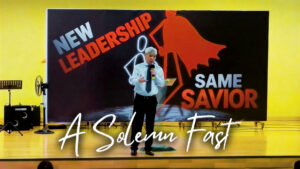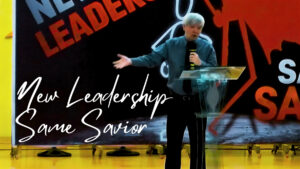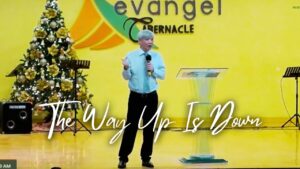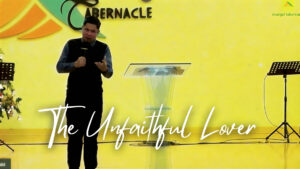Scripture Reading: Psalms 69:30-32
‘I will praise the name of God with a song, and will magnify him with thanksgiving. This also shall please the Lord better than an ox or bullock that hath horns and hoofs. The humble shall see this, and be glad: and your heart shall live that seek God.
A Christian man heard a message on the end times and decided to make all he could before the economy collapsed. He took his entire savings, went to the race track, and prayed for wisdom on how to bet. He watched the first race without betting. He noticed that a Catholic priest came out, sprinkled some water, waved his arms and made some signs over a horse. The horse won by seven lengths. The same thing happened on the second, third and fourth races. The man waited one more race just to make sure. Same thing–the horse that the priest blessed won. So on the sixth race he waited until the priest did his thing. Then he ran off and placed his entire savings on that horse. The race began. The horse ran 50 feet and dropped dead. The man was horrified! He ran down to the priest and said, “Priest, I have to talk to you!” “Yes, what is it, my son?” “Priest, I watched you in each race and in every race the horse you blessed won. So I went and bet everything I had on this horse. What happened?” The priest said, “You must be a Protestant.” “Why do you say that?” asked the man. “Because you don’t know the difference between a blessing and the last rites.” I wonder, could an outsider coming into a typical Sunday morning worship service tell whether we came here to bless God or to conduct His funeral? Would a person who doesn’t know God be able to look at your life and tell whether you have been blessed by God? Or would they conclude that the last rites must already have been pronounced upon you? Are you a person marked by heartfelt worship, whose life overflows with thanksgiving to God for His abundant blessings on your behalf?
When David says, “I will magnify God with thanksgiving,” he means: “I will make a big God begin to look as big as he really is.” And the avenue that magnifies God is thanksgiving. What can we learn from this portion of scripture?
1. Thanksgiving is a mark of all true children of God.
David said, “I will magnify God with thanksgiving.” When we give thanks to him from our hearts, God is magnified. Gratitude glorifies God. Why does it? The answer is simple: Givers are more glorious than receivers. Well the bible says, the lender is a servant to the giver. Benefactors are more glorious than beneficiaries. We have given rice to the community this Christmas, gifts to children in their Christmas Party. We raised more than 80,000 pesos for these events. I am sure you will agree with me that Benefactors are more glorious than beneficiaries. Likewise when we thank God, we acknowledge and display that he is the giver; he is the benefactor. We pay him a high compliment. When my two daughters were young and were angry at each other they do not say, “Thank you,” very easily. Then as parents, when good deeds were carried out, we came in and say, “Jan, tell Joy, ‘Thank you.'” So Jan mumbled, “Thank you.” Then we turned to Joy “Joy, say, ‘You’re welcome.”‘ So she mumbled, “You’re welcome.” And we all do this. Why? Isn’t it because saying “thank you” is a compliment; it magnifies people: You did a good thing for me; I’m indebted to you. But when you are angry at somebody, you hate to pay them a compliment; you want to belittle them, not magnify them; you hate to think of them as your benefactor. Therefore, when gratitude springs up in the human heart toward God, he is magnified as the wealthy source of our blessing. He is acknowledged as giver and benefactor and therefore as glorious
2. Thanksgiving pleases God more than sacrifice
Psalms 69:31 says ‘This will please the Lord more than an ox or a bull with horns and hoofs.’
Here God says thanksgiving pleases God more than sacrifice. There is an interesting connection between our text (Psalm 69:31 and Psalm 50:10.” Psalms 50:10 says ‘Every beast of the forest is mine, the cattle on a thousand hills.’ The ox or a bull represents offering and sacrifice. Because during those times they don’t bring notes and coins into the tabernacle. They bring ox or bull to the tabernacle. Well in the province, I still witness the members bring rice, chicken, eggs and fruits to the house of God. Today mostly in the city, we bring notes and coins and cheques. They represents our offering and sacrifice.
Please, we must understand that there is nothing wrong with bull or ox or coins or notes or cheques or rice or eggs or chickens. Actually the origin of sacrifice is invented by God and thus there is nothing with the sacrifice itself. But why does the offering of some expensive animal please God less than offering genuine thanks? The problem is with the attitude of the person bringing it. One of the reasons God was not pleased with the offering of an ox or bull or goat (representing monetary giving) was that the giver often thought that his gift was enriching God, was supplying some deficiency in God, and meeting someone’s need. I think that is an insult to God. When God says “Every beast of the forest is mine, the cattle on a thousand hills.” It is not addressing the issue of God supplying our needs; rather, it declares that God does not need our sacrifices. Most ancient near Eastern peoples believed that their gods depended on them for sacrifices, and if their gods were overpowered as a result of the sacrifices, their nation would be overpowered as well. I remember that when I was a Taoist, my parents always had to prepare meals for the kitchen god, the living hall god and the frontcourt god. Thai worshippers had to constantly feed the imps (little devil gods) so that they can be empowered to assist the feeder to be overpowered. The God of Israel reminds them that He is not like the pagan gods around them. Unlike Baal of the Canaanites (whose temples included a bed), Zeus of the Greeks (whom Hera put to sleep so her Greeks could win a battle), and other deities, the God of Israel neither slumbered nor slept (Ps. 121:3-4). There is some truth concerning all these deities because Elijah asked the worshipper or Baal and Asherah whether their gods has gone to the CR or are asleep and thus need to wake them up. But that is not our God. God says ‘You can’t give me a bull or an ox! They are already mine. On the contrary he is always a supplier of our needs. In its early days, Dallas Theological Seminary was in critical need of $10,000 to keep the work going. During a prayer meeting, renowned Bible teacher Harry Ironside, a lecturer at the school, prayed, “Lord, you own the cattle on a thousand hills. Please sell some of those cattle to help us meet this need.” Shortly after the prayer meeting, a check for $10,000 arrived at the school, sent days earlier by a friend who had no idea of the urgent need or of Ironside’s prayer. The man simply said the money came from the sale of some of his cattle! So I truly believe God is more pleased with our thanksgiving than our monetary offering.
3. Thanksgiving brings gladness and revival of heart
Psalms 69:32 ‘Let the humble see it and be glad; You who seek God, let your hearts revive!’
In many translations the word ‘humble’ is changed to the afflicted, the poor, and the oppressed. The poor are the needy. When we enter into thanksgiving, the poor and the needy would see God’s rescue and be glad and encouraged. They would be assured that the Lord would hear their cry too since He does not despise His own. And oppressed people everywhere will take heart when they realize that He will hear the needy and free the prisoners who call on Him. When you enter into thanksgiving you will see how ready God is to hear the poor when they cry to him, and to give them that which they call upon him for, how far he is from despising his prisoners; though men despise them, he favours them with his gracious visits and will find a time to enlarge them. Oh I have many enemies that despise Pastor Lily and I. But we know that God favours us. The humble shall see this and be glad, not only because when one member is honoured all the members rejoice with it, but because it is an encouragement to them in their straits and difficulties to trust in God. It shall revive the hearts. The oppressed when in thanksgiving will become glad. The key word is gladness. From gloom to gladness. Actually if you study the whole chapter of Psalms 69 which we have just studied verse 30-32, it is actually a chapter of gloom until verse 30 to 32. The first 10 stanza of this psalms can be summed up in one word; gloom.
I will just read Psalms 69:1-8 to prove my point.
‘Deliver me, O God, for the water has reached my neck. I sink into the deep mire where there is no solid ground; I am in deep water, and the current overpowers me. I am exhausted from shouting for help; my throat is sore; my eyes grow tired of looking for my God. Those who hate me without cause are more numerous than the hairs of my head. Those who want to destroy me, my enemies for no reason, outnumber me. They make me repay what I did not steal! O God, you are aware of my foolish sins; my guilt is not hidden from you. Let none who rely on you be disgraced because of me, O sovereign Lord and king! Let none who seek you be ashamed because of me, O God of Israel! For I suffer humiliation for your sake and am thoroughly disgraced. My own brothers treat me like a stranger; they act as if I were a foreigner.’
There was infirmity. The psalmist was in the day of trouble. His sore ran into the night. His soul refused to be comforted. He wonders whether God has cast him off and forgotten him. But the solution from gloom to gladness is thanksgiving. The heart that is sad will be revived when it enters into thanksgiving. Thanksgiving should be offered not only in good times but most importantly during bad times.
The first American Thanksgiving didn’t occur in 1621 when a group of Pilgrims shared a feast with a group of friendly Indians. The first recorded thanksgiving took place in Virginia more than 11 years earlier, and it wasn’t a feast. The winter of 1610 at Jamestown had reduced a group of 409 settlers to 60. The survivors prayed for help, without knowing when or how it might come. When help arrived, in the form of a ship filled with food and supplies from England, a prayer meeting was held to give thanks to God.
4. Thanksgiving recalls the goodness of God
Finally Psalms 103:1-2 says ‘Bless the Lord, O my soul, and all that is within me bless his holy name. Bless the Lord, O my soul, and forget not all his benefits. Psalms 77:11 says ‘I will call to mind the deeds of the Lord; yea I will remember the wonders of old. I will meditate on all thy work, and muse on thy mighty deeds. Thy way, O God is holy. What God is great like our God?’
This morning I am calling on all to focus on the abundant goodness of God for the year 2014. David says “forget none of His benefits”. It’s human nature to forget God’s benefits. Focusing on God’s blessings must be a deliberate choice. Therefore, when gratitude springs up in the human heart toward God, he is magnified, He is acknowledged as giver and benefactor and therefore He is glorious.
Bless when applied to God means to praise but with a strong implication of devout affection. ‘All that is within me’ refers to my insides or inner parts and also my heart and mind. In some translation ‘forget not all his benefits’ is written as ‘forget not all his dealings’. Israel is frequently admonished in the Law of Israel not to forget the LORD who brought them out of Egypt. Dealings means to treat or to treat well. The idea here conveyed is that of treatment. God has been kind and gracious in his treatment of us; thus the rightful thing to do is to bless the LORD.
Some translator put Psalms 77:11 as ‘I will commemorate the deed of JAH; for I will remember thy wonders of old. It is to remember, meditate and muse on the deeds of the LORD and to recall His wonders of old. Instead of mulling over all the problems and pains and fears we’re tangled up in, instead of thinking back on how great things used to be, let us remember who God is, his provisions for us over the whole year 2014.
I thank God for good health. Just a few days ago, I went to Brother Rene’s house to give him a cake made especially by Pastor Lily. There I met Benjie, his son-in-law, which honestly I had not seen for more than 10 years. The first thing he saw me was he said, I look good. Well Pastor Lily explained that what he meant is that I have put on weight or I am fat. I thank God for good health. I thank God for protection on my children. I thank God for blessing them. I want to thank God that all is well in the family. My mum is close to 80 soon and recently she had some kidney problem and we prayed and recently the doctor said her kidney is fine. I am thankful to God for that. I thank God that there is food on the table every table and many a times, it is more than enough. I thank God for a house that I can stay in. We invited a group of people to our house on 24h of December and many that came commented that it is a very beautiful place. I thank God for that. I thank God for my wife that she is nothing but simply a blessing to my life and to this church. I thank God for new friends that we made from Singapore. God gave us new Singaporean friends and even more and better Singaporean friends. Last Sunday, almost 400 people paid to join our 29th Family Night. One member commented, our church is back to the year before 2012. Oh yes, we have to thank God for that. I thank God for this serene place of worship. I thank God for protecting us from Typhoon Pablo, Typhoon Yolanda and Typhoon Ruby for the past 3 years. I thank God that we are starting to do church planting again. I thank God that we are able to feed 1 thousand people every week and they are coming to our church in the afternoon service. I thank God for blessing our children’s church and our third service.
There are so much things we can thank God for. Don’t look at the dark side because God will take care of it. Look at the bright side because God is involved in it. Scottish minister Alexander Whyte was known for his uplifting prayers in the pulpit. He always found something for which to be grateful. One Sunday morning the weather was so gloomy that one church member thought to himself, “Certainly the preacher won’t think of anything for which to thank the Lord on a wretched day like this.” Much to his surprise, however, Whyte began by praying, “We thank Thee, O God, that it is not always like this.”
In Budapest, a man goes to the rabbi and complains, “Life is unbearable. There are nine of us living in one room. What can I do?” The rabbi answers, “Take your goat into the room with you.” The man in incredulous, but the rabbi insists. “Do as I say and come back in a week.” A week later the man comes back looking more distraught than before. “We cannot stand it,” he tells the rabbi. “The goat is filthy.”
The rabbi then tells him, “Go home and let the goat out. And come back in a week.” A radiant man returns to the rabbi a week later, exclaiming, “Life is beautiful. We enjoy every minute of it now that there’s no goat — only the nine of us.”
Hudson Taylor, who endured great hardships and tragedies in his lifelong mission work in China, said when he was old, “I never made a sacrifice.” What he meant was that along the path of self-denying service he experienced so much joyful gratitude for God’s sustaining grace that, whatever he forsook to buy that pearl, it is as if there were no sacrifice at all. Therefore, a life that gives glory to God for his grace and a life of deepest gladness are always the same life. And what makes them one is gratitude.
We are entering into a New Year in a few days’ time. One of Pastor Lily’s objective is to teach the members warfare praise. It is actually thanksgiving. And thanksgiving is powerful.
Make a Plan for the New Year. It is a strategy laid out in Psalm 77:11. Notice those words of intentionality and purposefulness in verses 11-12, “I will remember . . . I will meditate . . . I will muse.” We want to intentionally praise God. We want to purposefully bless God and offering thanksgiving.





